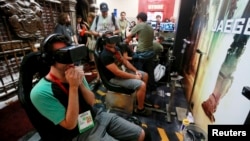A Tyrannosaurus rex lumbers forward, belts out a deafening roar, then stomps overhead, and a viewer watching inside a virtual reality headset turns around to see the beast walking away.
The lifelike run-in with a prehistoric monster comes courtesy of prototype Oculus Rift goggles, giving a glimpse of a future that breaks movies out of the flat screen.
Virtual reality, which immerses viewers in 360-degree worlds long used in video games, is drawing top Hollywood filmmakers and studios such as Twenty-First Century Fox and Walt Disney Co. The technology should arrive on the consumer mass market within two years.
Virtual reality can transport audiences into the middle of the movie landscape, says Brendan Iribe, chief executive of Oculus, which Facebook Inc. acquired this year for $2 billion.
"In some decade or two, we are going to be at a point where watching things on 2-D surfaces is going to feel pretty outdated," Iribe told Reuters.
Virtual reality still has technological hurdles to overcome.
The biggest problem is motion sickness in some users, which Oculus believes it is close to resolving.
Hollywood directors are trying to figure out how to create 360-degree scenes, and it remains unclear if audiences will want to spend two hours in a virtual world, or just visit for shorter experiences.
Baby Steps for Bigger Screens
Iribe has big ambitions for Oculus Rift devices, the latest version unveiled at a developers conference on Saturday in Hollywood. A prototype is sold now to developers for $350 per headset.
With a consumer version on the horizon, Iribe believes virtual reality devices could be in the hands of millions of consumers within a couple of years.
Designers at Disney's Lucasfilm are playing around on the desert planet Tatooine, exploring how to bring virtual reality to the "Star Wars" universe as the studio prepares to release Episode VII of the film franchise in 2015.
"Lucasfilm absolutely thinks this is a phenomenal space to be in," said John Gaeta, Lucasfilm's Oscar-winning creative director of new media and experiences.
To take smaller steps toward bigger screens, digital projection company Barco is introducing Barco Escape, a 270-degree panoramic screen, in movie theaters. The three-piece screen expands to the left and right of the theater walls.
Fox is currently testing Barco Escape in select Cinemark theaters with young adult thriller "The Maze Runner", where scenes were extended onto the expanded screens using computer-generated digital imagery.
"Maze Runner" director Wes Ball said the extended screens were intended to immerse viewers in the visually expanded world of the film, without detracting from the central screen.
'Places Nobody Has Gone'
The bigger screens will attract younger audiences, especially those used to the bigger screens in video games, said Barco's "cinemavangelist" Ted Schilowitz. He is also Fox's resident "Futurist," developing projects in a virtual reality bunker on the studio's Los Angeles lot. Disney's Pixar Animation Studios is also testing Barco Escape.
Schilowitz calls Barco Escape the "bricks and mortar version" of virtual reality and films adapted to the 270-degree screen format can work on Oculus Rift.
"This is the average consumer's entry point to what a more immersive experience feels like," he said.
Oscar-nominated filmmaker Guillermo Del Toro, an early adopter of new technology in film, presented an Oculus Rift game based on 2013's "Pacific Rim" at San Diego's Comic-Con in July.
But Del Toro told Reuters "it will be hard to direct [a movie] because you have to show the audience what to see" when viewers can look anywhere.
But Robert Stromberg is undeterred. The Oscar-winning production designer of 2009's "Avatar" and director of Disney blockbuster "Maleficent" now splits his time between traditional filmmaking and virtual reality storytelling, developing content for Oculus devices.
"I'm really trying to see how the two can marry together," he said. "I love the pioneering aspects. There is a thrill and an excitement to going in those places nobody has gone before."





